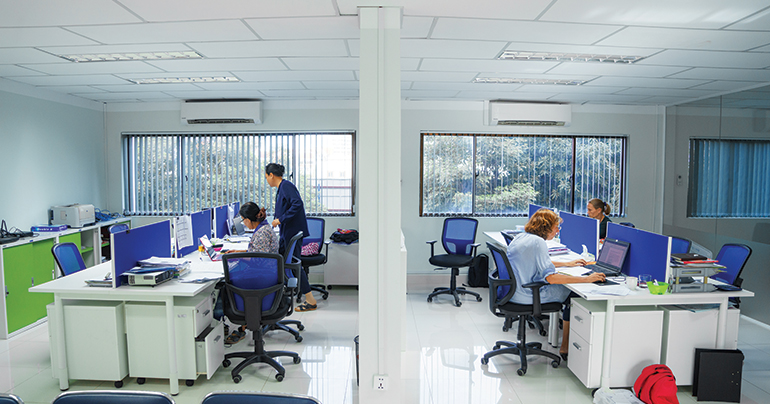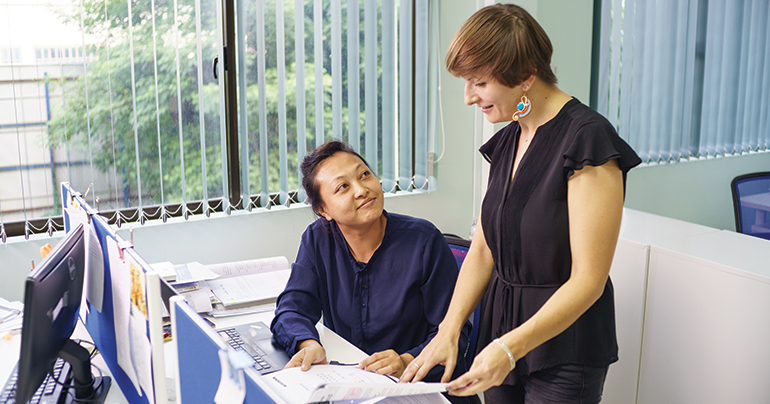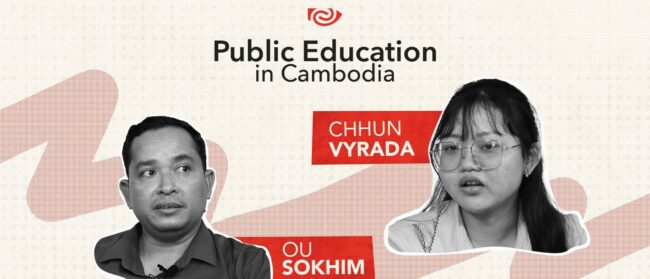Tell us about VVOB’s role in the teacher academy and its curriculum…
In 2016, [the Japan International Cooperation Agency] signed an agreement with the Ministry of Education, Youth and Sports [MoEYS] to support them in developing new institutes of higher education that are responsible for the new teacher training. The current teacher training is two years. Basically, you finish secondary school, and you can do an entrance exam and start the… two-year [training before entering the field]. That’s both for a primary school teacher and lower secondary school teacher. They’re changing that to a four-year degree, so not only is the whole curriculum changing, also the institutes that give this training are completely new… We joined the project in 2017 along the way and we are responsible for the development of 12 [primary school-level] syllabi [across] mathematics, managing learners… professional practice and inquiry… [and] teaching practicum.
What are some examples of what you hope to see change between the two-year programme and what will be the four-year programme?
One crucial element, I think, is reflection – a teacher’s critical reflection on his or her teaching and having the skills to look up what can be changed, to look up how lessons can be improved or think about: “I intended to do this in my lesson but I didn’t reach my goal. So what was it that made me not reach that goal?” So basically to move from the current idea of: “We prepare a lesson plan. We teach this lesson plan. We kind of verify if the students get the content or not, and then we continue with the following lessons.” We want them to be continuously critical of what they’re teaching, how they’re teaching it, how the students are [taking it in and] if they understand it fully… It’s crucial if you want to shape teachers that are skilled to teach in the 21st century – and to not only adapt within this 21st century to how society is changing, but also teach the learners how to adapt themselves within that context and prepare them for a future that is changing… So that’s the biggest goal: to change the two-year teacher training into a four-year teacher training [so that Cambodia] can start to compete with surrounding countries on a level that produces reflective, critical teachers who are able to adapt to society.

One common critique of the Cambodian education system is that it relies heavily on rote memorisation. How will this programme push teachers and learners out of that habit?
With the syllabi that we are responsible for, we integrate methodologies for teaching. So it’s not only content… If you look at the build-up of the curriculum, like in other countries, the teacher education programme is split up so that you have topics or subjects that focus on the methodology of teaching and others that focus on the content of the teaching, right? So we are responsible for both… When it comes to the methodology of teaching, all the methods that are in there are meant to activate the students, are meant to involve them, to develop critical thinking within the students themselves, make sure they understand how to research certain things, how to validate if they have an idea from the content [to see] if it matches with the reality. So the methodologies of teaching that are integrated in the syllabi are very much student-centred and not at all focused on just memorising and repeating and memorising and repeating.
How will this help Cambodia compete regionally?
I think it most definitely will because the focus is strongly [based] on these 21st-century skills. The whole idea of changing the education system, the seeds of it, is basically working towards [becoming] a higher middle-income country. So that’s the aspiration. It’s slightly economically driven to be able to compete with the neighbouring countries, to be able to compete with the demands of society… The essence of the teacher training college is reflective practice also for the institute, which means that the curriculum as it is now written needs to evolve. The lecturers need to critically look at what they’re teaching and change it if it needs to be changed, adapt it more. So in that regard, the curriculum as it is now will grow even more to fit the needs and demands of society and continuously improve.

Cambodia has long struggled with student enrolment and retention, with roughly half a million primary- to secondary-school-aged children not attending school, according to a 2017 Unesco report. Completion of primary school is seen as a fundamental factor in that. How do you see this new teacher training program impacting this trend?
There are many facets [behind] student dropout. One of the elements is the competencies that students have when they reach the end of primary education, and that reflects on the quality of teaching [and] the competency of teachers, which unfortunately in the provinces are sometimes too low. Basically, you want students to have a set of competencies that are valuable at the end of the line of primary education. [It’s important] that parents also see these competencies that prepare [their children] for the education that is to come next [so they are motivated to keep them enrolled]… That goes back to the quality of teaching, so the new four-year teacher training will most definitely contribute to that… The whole package really will improve the quality of teaching of teachers and hopefully lead to keeping children in school and helping them continue to secondary education so there is less dropout.
Lecturers need to critically look at what they’re teaching and change it if it needs to be changed, adapt it more
What are considerations and challenges you have met in developing the curriculum?
One element is the level of English of teachers, because if you want teachers to be able to look up different resources – “how can I teach in a different way about this topic in mathematics?” – then most of the documentation, most of the scientific papers are written in English. So that’s something that we have to keep in mind when we write the syllabi and develop the curriculum… Every time we write bits and pieces of the syllabus, we keep thinking, is this crucially necessary? [If so], then it needs to be translated just to have a fall-back. If it’s not necessary, we’ll put it on the suggested reading list and it’s not necessarily translated then.
When do you expect that the Cambodian education system will see the effects of this new teacher training curriculum and academy?
I think the first batch of students who complete the full four years will be still very much a try-out – maybe that’s too harsh of a word, but it’s new for everyone involved, and everyone needs to get used to the new curriculum. So the first cohort that finishes it will not yet be the trendsetters or the ones who make the difference, I think. I think it’s going to be the next one after that. You’ll also have [more] teachers coming out [and] the number will just be bigger. Even with the current teachers, you can see a big gap between the older-generation teachers and the younger-generation teachers. [In] the way of thinking about teaching, what the role is of a teacher, how much time they’re willing to invest in improving their teaching, [there] is already a big difference between the two. You can see that. So partially it will be waiting until the older generation leaves the education system and the new generation streams in to see the big effect, to see the big impact.


